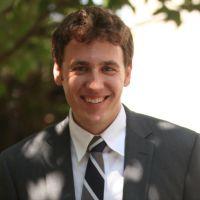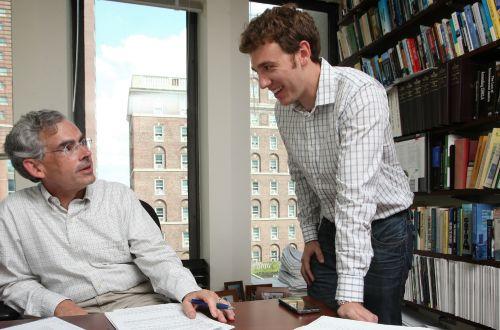Taking a Stand in the Trials of Planet Earth
Columbia Law School Student Phillip "Dane" Warren '17 Puts his Passion for Environmental Justice to Work at the Sabin Center for Climate Change Law
New York, July 23, 2015—When Columbia Law School student Phillip “Dane” Warren ’17 was in the 8th grade, he served as the lead prosecutor in a class project called “The Trial of Planet Earth.”
He sued the human race over climate change and other negative impacts on the planet, marshaling a team of fellow classmates who conducted research for their roles as supporting attorneys and expert witnesses.
He won.
“It was the first time I had ever been exposed to crucial environmental issues in a structured, in-depth way,” Warren said. “For whatever reason, it stuck with me. “
| Phillip “Dane” Warren ’17 became interested in environmental justice in the 8th grade. |
The project put Warren on a path toward environmental justice that he continues to follow today. As an undergraduate economics student at Texas A&M University, he was honored in part for his research paper on cap-and-trade policies, and he later studied the effects of non-linear water pricing on water usage with data from a Texas utility.
Now, as a rising second-year law student, he’s gaining experience under the guidance of Professor Michael B. Gerrard at the Sabin Center for Climate Change Law, contributing to the center’s policy and legislative work to encourage mitigation and adaptation to climate change. Warren is one of several students the center is hosting this summer from Columbia Law School and various undergraduate and graduate institutions.
Earlier this summer, he contributed to a U.N. Security Council presentation at the request of the Spanish Permanent Representative to the U.N. in which Gerrard argued the council can take action to help the world prepare for and cope with rising seas and loss of food and water security. Along with Nathan B. Utterback ’17, Warren wrote up a summary of the Security Council meeting for the Sabin Center’s Climate Law Blog.
“It was incredibly fulfilling to see some of what I had worked on presented to a group of global leaders with the power to act,” Warren said.
Warren also is working with Sabin Center Executive Director Michael Burger ’03, Associate Director and Postdoctoral Fellow Jennifer Klein, and the New York Department of State on a model ordinance to help local communities incorporate climate risk measures as required by the Community Risk and Resiliency Act signed by Gov. Andrew Cuomo last fall.
Over the summer, Warren and other students including Jonathan W. Allen ’17, have assisted in:
- producing—for the United Nations Development Programme, the International Federation of Red Cross and Red Crescent, and the government of Laos—an integrated disaster management and climate change law for Laos, which is vulnerable to climate-related hazards such as floods and droughts;
- exploring prospects for increasing greenhouse gas emissions reductions through Farm Bill programs in conjunction with the Natural Resources Defense Council;
- preparing a comprehensive study of the treatment of climate change in environmental impact statements prepared under the National Environmental Policy Act; and
- developing the Sabin Center’s online resources, including a compilation of the climate change laws of the world.
| Warren worked with Sabin Center Director Professor Michael B. Gerrard on a presentation Gerrard made to the U.N. Security Council about the risks posed by climate change. |
For Warren, the work—funded through Social Justice Initiatives’ Guaranteed Summer Funding program, which supports students who choose to pursue public interest law—is way to make a difference in an important field.
“It’s not hard to become disheartened when you’re working on something like climate change,” he said. “But collaborating with such passionate and talented people every day makes it easy to find the bright spots and the drive to work towards legal solutions to these complex problems.”
Some spots are brighter than others. Last month, in a decision that makes Warren’s 8th grade project seems prescient, a court in The Hague ruled in favor of Dutch citizens who filed a lawsuit claiming their government wasn’t doing enough to protect them from climate change. The court held that the government must cut emissions by 25 percent in five years, more than the 17 percent the government initially pledged.

